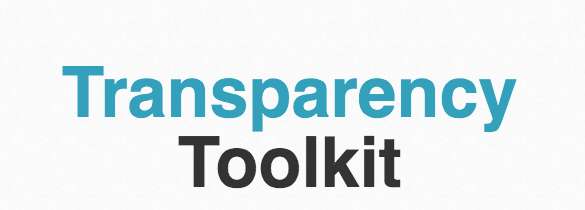 We need information about governments, companies, and other institutions to uncover corruption, human rights abuses, and other problems. Unfortunately, the information provided by most transparency initiatives today (WikiLeaks, Project PM) is difficult to understand and/or incomplete. Transparency Toolkit (TT) is an open source web application that helps organizations and individuals collaboratively collect, analyze, and release actionable public interest information. The goal is to make it as accessible to the layman as possible.
We need information about governments, companies, and other institutions to uncover corruption, human rights abuses, and other problems. Unfortunately, the information provided by most transparency initiatives today (WikiLeaks, Project PM) is difficult to understand and/or incomplete. Transparency Toolkit (TT) is an open source web application that helps organizations and individuals collaboratively collect, analyze, and release actionable public interest information. The goal is to make it as accessible to the layman as possible.
Meet MC McGrath. He’s the founder of Transparency Toolkit (TT). He has been with the Mass Pirates since the tender age of 16. He conceived of (and began creating) a web application that would make it so that anyone who can read and operate a digital device can access and understand the deluge of digital information being uncovered and shared on the internet today. TT will be an excellent tool for journalists, activists, educators and anyone concerned with the transparency of governments and corporations.
Sounds useful, doesn’t it? It will be, but we need your help. If you would like to see this come to fruition, please volunteer. Your level of expertise does not matter. We *will* put you to work doing something useful. Your efforts will be greatly appreciated.
Please review this outline to get an understanding of what needs doing. If there is anything you think you can do to help, then you can help. Please email discuss@transparencytoolkit.org (the TT discussion email list) your responses to the following questions:
- Procedure for helping
- Helpful things to do if you can’t program
- Helpful things to do if you can program
- Questions to answer
I. Procedure for helping
The following is the procedure for helping with Transparency Toolkit/how the volunteer community will communicate, but you do not need to participate in every thing listed. Only the first 1-3 are necessary depending on how involved you want to be.
- Meta Transparency Toolkit: If you are working on something, please add it to Meta Transparency http://meta.transparencytoolkit.org. Some general things you can do to help are below, but specific things will also be posted on Meta Transparency Toolkit too.
- Individual Meetings: MC will meet with every person actively helping with Transparency Toolkit once a week for up to thirty minutes. During this time we will go over what you are working and any issues you run into. He will also point you to resources and/or teach you how to do things (encryption, scraping, etc.) if you want. We want to meet with volunteers regularly, but meeting for longer every other week or for less time are also fine.
- Group Meetings: We will meet on the Transparency Toolkit IRC channel (#transparencytoolkit on Freenode) every two weeks so people can share what they are working on and discuss problems in real time. These meetings will not exceed 45 minutes. We will send out a doodle for scheduling a group meeting soon and we will send out a link to access the channel in your browser before every meeting.
- Group Discussions: After the group meetings we will have open discussions of issues related to Transparency Toolkit like transparency, privacy, data analysis, etc. We will decide on the topic for the next discussion when we meet and will send out an email with links to information on the topic beforehand.
- Workshops and Skillshares: If enough people are interested in learning about something or two people want to learn something that the other person knows, we will coordinate workshops and skillshares.
- In-Person Meetings: We will likely meet in person occasionally in Boston if there are a few people working on Transparency Toolkit in the same area.
II. Helpful things to do if you can’t program
Right now the biggest thing we need help with is programming, so if you can program please, please help with that. That said, there are lots of things you can do to help if you can’t program that are also extremely helpful. You can:
- Find bugs: Play with Transparency Toolkit and find things that are broken or don’t work the way they should. When you find a bug, add it to the list of tasks under “Bugs to fix” on Meta Transparency Toolkit (http://meta.transparencytoolkit.org).
- Find information sources and analysis tools: Find information sources (documents, data sets, APIs for accessing data) and open source analysis tools (for visualizing, combining, filtering info sources) that should be accessible via Transparency Toolkit and add them to http://piratenpad.de/THx745T4Xk
- Research information sources and analysis tools: Find analysis tools similar to ones we want to make and the easiest ways to access information sources listed at http://piratenpad.de/THx745T4Xk.
- Conduct case studies and surveys: Conduct case studies on how organizations receive, analyze, and release information (like the ones at http://leakswiki.org). Make and send out surveys to collect metrics both on current practices and usage of Transparency Toolkit.
- Create and clean up documents: Clean up documents about Transparency Toolkit to make them easier to read and understand. Create documents about Transparency Toolkit. We will send out documents we need feedback on to the list. Ask us about documents that need to be created as these change a lot.
- Provide user experience and design feedback: Play with Transparency Toolkit and tell us what parts are hard to use. Or let one of us watch how you use Transparency Toolkit so we can see which parts aren’t as intuitive as they need to be.
- Find organizations interested in using Transparency Toolkit: Find and contact organizations that might be interested in using Transparency Toolkit. This is not a major priority right now because a lot of organizations are interested.
- Help with investigations: Help other organizations with their investigations or start your own using Transparency Toolkit.
- Tell others about Transparency Toolkit: Spread the word about Transparency Toolkit. Also help us figure out the best ways to explain Transparency Toolkit to others.
III. Helpful things to do if you can program
- Find and fix bugs: Find, report, and fix bugs. This is a good thing to do if you are not sure how much time you have to help or want to be familiar with the code.
- Help with development of the base platform: Help work on the base platform. This includes the system for collaborative investigation, information bank, analysis plugin system, etc. If you help with the main platform and are not sure you can finish something, please either help with things a ways out in the development schedule or lower priority
- Make plugins for accessing information sources: Write scrapers, make programs to use existing APIs with Transparency Toolkit, etc.
- Make analysis tools: Create or adapt analysis tools for use with Transparency Toolkit. We are working on a plugin system, but until then we are making analysis tools as gems and manually adding them to Transparency Toolkit.
IV. Questions to answer
If you are interested in helping with Transparency Toolkit or have already been helping, please answer the following questions and send your responses to discuss@transparencytoolkit.org.
- What parts of Transparency Toolkit are you most interested in helping with?
- What are your skills (coding, design, writing, accounting, research, PR, etc.)?
- Can you help regularly? If so, how much time do you think you can commit?
- What issues related to Transparency Toolkit are you most interested in (gov transparency, anti-corruption, privacy, data analysis, etc.)?
- Is there anything related to Transparency Toolkit that you want to learn (encryption, scraping data, coding, journalism, etc.)?
- When are you available to talk more and what is your preferred method of communication?
This is a very exciting project, and if you get on board now, you can say you were there from the beginning. I am personally very excited and I am looking forward to working with YOU.
And now that you have read all the way to the end of this very long post: PLEASE SHARE IT WIDELY! If we build it, they will come!


Meet MC McGrath. He’s the founder of Transparency Toolkit (TT). He has been with the Mass Pirates since the tender age of 16. He conceived of (and began creating) a web application that would make it so that anyone who can read and operate a digital device can access and understand the deluge of digital information being uncovered and shared on the internet today. TT will be an excellent tool for journalists, activists, educators and anyone concerned with the transparency of governments and corporations.
Sounds useful, doesn’t it? It will be, but we need your help. If you would like to see this come to fruition, please volunteer. Your level of expertise does not matter. We *will* put you to work doing something useful. Your efforts will be greatly appreciated.
Please review this outline to get an understanding of what needs doing. If there is anything you think you can do to help, then you can help. Please email discuss@transparencytoolkit.org (the TT discussion email list) your responses to the following questions:
I. Procedure for helping
The following is the procedure for helping with Transparency Toolkit/how the volunteer community will communicate, but you do not need to participate in every thing listed. Only the first 1-3 are necessary depending on how involved you want to be.
II. Helpful things to do if you can’t program
Right now the biggest thing we need help with is programming, so if you can program please, please help with that. That said, there are lots of things you can do to help if you can’t program that are also extremely helpful. You can:
III. Helpful things to do if you can program
IV. Questions to answer
If you are interested in helping with Transparency Toolkit or have already been helping, please answer the following questions and send your responses to discuss@transparencytoolkit.org.
This is a very exciting project, and if you get on board now, you can say you were there from the beginning. I am personally very excited and I am looking forward to working with YOU.
And now that you have read all the way to the end of this very long post: PLEASE SHARE IT WIDELY! If we build it, they will come!